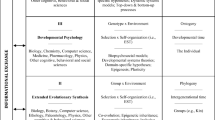Abstract
At the biological level, what is innate is the result of an evolutionary process and is “programed” by natural selection. Natural selection is the “coder” (once linked to the emergence of meaning). This coupled process is indissolubly correlated with the continuous construction of new formats in accordance with the unfolding of ever-new mathematics, a mathematics that necessarily moulds coder’s activity. Hence, the necessity of articulating and inventing a mathematics capable of engraving itself in an evolutionary landscape in accordance with the opening up of meaning. In this sense, for instance, the realms of non-standard models and non-standard analysis represent, today, a fruitful perspective in order to point out, in mathematical terms, some of the basic concepts concerning the articulation of an adequate intentional information theory.
Similar content being viewed by others
References
Atlan H (2000) Self-organizing networks: weak, strong and intentional, the role of their under determination. In: Carsetti A (ed) Functional models of cognition, Dordrecht, pp 27–143
Bais FA, Doyne Farmer J (2008) The physics of information. In: Adrians P, Van Benthem J (eds) Philosophy of information, Amsterdam, pp 609–684
Bray D (1995) Protein molecules as computational elements in living cells. Nature 376:307–312
Calude C, Chaitin G (1999) Randomness everywhere. Nature 400(22):319–320
Carsetti A (2000) Randomness, information and meaningful complexity: some remarks about the emergence of biological structures. La Nuova Critica 36:47–109
Carsetti A (2013) Epistemic complexity and knowledge construction, New York
Chaitin G (1987) Algorithmic information theory. Cambridge
Chaitin G (2007) Meta maths: the quest for omega. New York
Chaitin G (2010) Metaphysics, metamathematics and metabiology. APA Newsl 10(1):11
Chaitin G (2013) Proving Darwin: making biology mathematical. New York
Dougherty ER, Bittner ML (2010) Causality, randomness, intelligibility, and the epistemology of the cell. Curr Genomics 11(4):221–237
Gödel K (1972) On an extension of finitary mathematics which has not yet been used. In: Feferman S et al (eds) (1989) Kurt Gödel. Collected Works, vol. II, Oxford
Gould SJ, Vrba ES (1982) Exaptation—a missing term in the science of form. Paleobiology 8(1):4–15
Henkin L (1950) Completeness in the theory of types. J Symb Log 15:81–91
Kauffman LH (2003) Eigenforms—objects as tokens for eigenbehaviours. Cybern Hum Knowing 10(3–4):73–90
Landsberg PT (1978) Thermodynamics and statistical mechanics. London
Manzano M (1996) Extensions of first-order logic. Cambridge
Martin-Delgado MA (2011) On quantum effects in a theory of biological evolution. arXiv: 1109.0383v1
Mostowski A (1965) On models of Zermelo-Frankel set theory satisfying the axiom of constructibility. Acta Phila Fenn 18:135–144
Nottale L, Schneider J (1964) Fractals and nonstandard analysis. J Math Phys 25(5):1296–1300
O’Nuallain S (2008) Code and context in gene expression, cognition, and consciousness. In: Barbieri M (ed) The codes of life: the rules of macroevolution, vol 15. Springer, New York, pp 347–356
Putnam H (1965) Trial and error predicate and the solution to a problem of Mostowski. J Symb Logic 30
Schroedinger E (1944) What is life? Cambridge
Skolem T (1960) Investigations on a comprehension axiom without negation in the defining propositional functions. Notre Dame J Form Log 1(1–2):13–22
von Foerster H (1981) Observing systems, the systems inquiry series. Intersystems Publications, Seaside Salinas
Wallace R (2014) Cognition and biology: perspectives from information theory. Cogn Process 15(1):1–12
Author information
Authors and Affiliations
Corresponding author
Rights and permissions
About this article
Cite this article
Carsetti, A. Life, cognition and metabiology. Cogn Process 15, 423–434 (2014). https://doi.org/10.1007/s10339-014-0623-3
Received:
Accepted:
Published:
Issue Date:
DOI: https://doi.org/10.1007/s10339-014-0623-3




